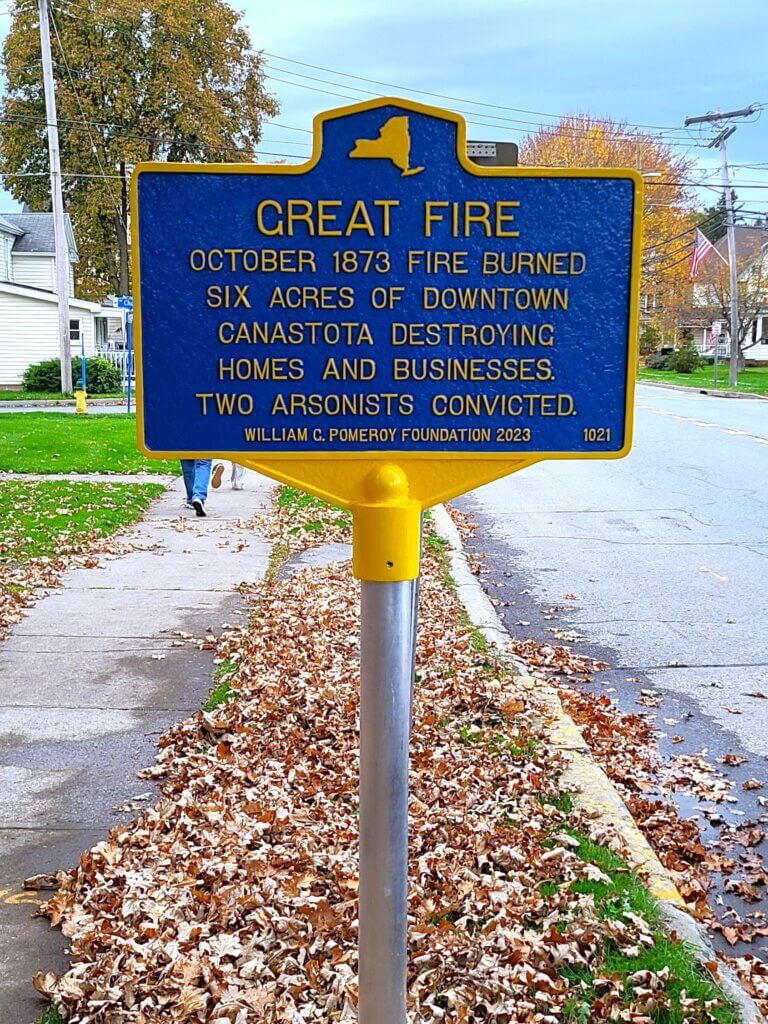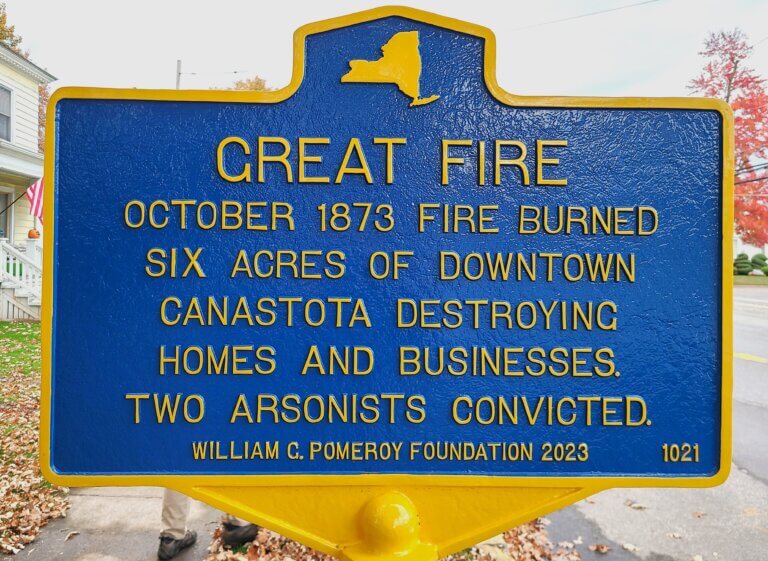GREAT FIRE
- Program
- Subject
- Location
- Lat/Long
- Grant Recipient
-
NYS Historic
-
Event, Industry & Commerce, Site
- 127 N Peterboro St, Canastota, NY 13032, USA
- 43.0804038, -75.7510436
-
Village of Canastota
GREAT FIRE
Inscription
GREAT FIREOCTOBER 1873 FIRE BURNED
SIX ACRES OF DOWNTOWN
CANASTOTA DESTROYING
HOMES AND BUSINESSES.
TWO ARSONISTS CONVICTED.
WILLIAM G. POMEROY FOUNDATION 2023
In October 1873, a fire burned through downtown Canastota in Madison County, NY. The October 31, 1873 Oneida Dispatch, reported on the “Great Fire in Canastota,” noting that it was suspected to have been intentionally set. Six acres of property in the heart of the village were destroyed, including numerous homes and businesses. At least two people were injured, however, no lives were lost. Canastota had suffered another fire earlier that year, and it was speculated that the two fires were connected. Regarding the outbreak of the October “Great Fire,” the Oneida Dispatch article stated:
“A great conflagration has again visited Canastota, more destructive by far than the one which occurred there on the 19th of April last. … About 9 o’clock on Sunday evening, October 26th, an alarm of fire was sounded, and on repairing to the scene of conflagration, it was found to be the hay barn of the N.Y.C. & H.R.R., situated in the eastern portion of the village, but the flames had got so far advanced that all efforts to save the building or contents were unavailing, and it burned to the ground. The fire was seen by our citizens, but on learning that it was subdued, no farther notice was taken of it, and all went home and retired; a like feeling was felt by the citizens of Canastota, and they too, retired. This, however, was not to be the end, for shortly after one o’clock another alarm was given, and after the early experience of the evening, all were quickly aroused, and went to the scene of the new outbreak. On arriving there, it was found that the barn of the Central Hotel, in the rear of Beecher Block, was in flames. This had been locked, and no one connected with the hotel had been into it during the evening, hence this, as well as the first fire, were thought to be the work of incendiaries.”
With strong winds, this second fire spread quickly and raged for over five hours. Two entire blocks of the village burned to the ground, from Center to Chapel Streets, on the west side of Peterboro Street. Only one structure stood after the fire, the Beecher Block on the corner of Center and Peterboro, although the building was badly damaged. In total, three hotels, twelve stores, twelve dwellings, and several barns and other such outbuildings were lost. A number of families were left without homes or any belongings. Charitable donations from the surrounding community came in immediately, and D.H. Rasbach of the Canastota Bank was authorized to receive the donations. A substantial donation came from Gerrit Smith, a prominent abolitionist who resided nearby. The Oneida Dispatch published the letter accompanying his donation:
“Dear Sirs: – “Bis dat qui cito dat,” hence without any delay I send my gift. Please distribute the enclosed thousand dollars at your own discretion amongst the sufferers by last night’s fire in Canastota. Your pity for the most needy will of course control the distribution. Your friend, Gerrit Smith.
P.S. – Let not Canastota despair. She has still more left than she has lost. She has her own brave hearts left. She has the sympathy and prayers of her fellow men left. – Above all, the living God is left to her.”
Two men, Melvin S. Woodford and William A. Stone, were eventually arrested on charges of arson. Woodford confessed his involvement in the crime, while Stone offered only a partial confession, maintaining that while he was involved, it was Woodford who set the devastating fire. Despite this, both men were convicted in March 1874, receiving life sentences in state prison. On December 25, 1884, the Fayetteville Weekly Recorder reported Woodford and Stone had been pardoned by NY State Governor Grover Cleveland, effective January 1885 and to “continue while they abstain from intoxicating drinks.”



